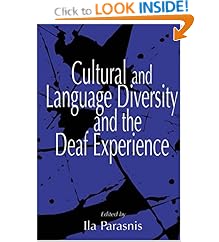This blog contains the description on the phenomena in language, society, and culture
Showing posts with label Language and Culture. Show all posts
Showing posts with label Language and Culture. Show all posts
Friday, October 31, 2008
Cultural and Language Diversity and the Deaf Experience
"Parasnis' 'Cultural and Language Diversity and the Deaf Experience' will be a valuable addition to the library of professionals who provide services to Deaf people. It will also be of considerable interest to researchers, instructors, and professionals in minority education and bilingualism. All will be informed by the varied perspectives of the impact of language and culture on the experience of membership in a minority group." Contemporary Psychology "Nonspecialists will find that this book provides an intriguing and provocative introduction to Deaf culture, and specialists in deafness-related professions will appreciate this volume for its broad coverage of socioculture issues that impact the lives of Deaf children and adults."
Janet R. Jamieson, Contemporary Psychology "The book, Culture, Language Diversity and the Deaf Experience, is an elegant and comprehensive exposition of one side of this long-standing debate in deaf education -- the side which portrays deaf people as comprising a bilingual and bicultural minority group whose native language is a signed rather than a spoken language (ASL/LSQ). In three well-organized sections, the editor...assembles readable articles...drawing from a wide variety of experts with both academic and personal experience in the field of deafness. The articles are the ultimate product of colloquia on the same topic that were held earlier at the National Technical Institute of the Deaf." McGill Journal of Education "...the section with personal essays makes the book especially attractive for a wider audience. This innovative and interdisciplinary volume is highly recommended for all interested in linguistic and cultural diversity: linguists, psychologists, anthropologists, sociologists, sign language interpreters, researchers and educators involved in the education of the Deaf, and last, but not least, all those who deal with the experience of living in the Deaf and Hearing worlds on a daily basis." SocioLinguistics
Language, Culture, and Society: A Book of Readings
Twenty-four articles representing a diversity of interests and approaches have been brought together in this collection intended to define and develop topics of central interest to language, culture, and society. Opening pieces include enduring, classic writings by Boas, Sapir, Whorf, Mead, and others, giving the volume an important historical orientation. These contributions form the groundwork for the wide sampling of more recent and contemporary works that follows.
The selections chosen for Language, Culture, and Society, Second Edition, reflect several major themes within the field: language in relation to thought and cognition; language in relation to the cultural partitioning of the environment; language in relation to self-as-social; language in relation to social differentiation; and language in relation to its emergence as a sociocultural phenomenon. The editor's helpful introductions point out significant ideas and trace the development of the twenty-four contributions that form a diverse, well-balanced, and up-to-date volume.
Language, Culture, and Communication: The Meaning of Messages
Using data from cultures and languages throughout the world to highlight both similarities and differences in human languages—this text explores the many interconnections among language, culture, and communicative meaning. It examines the multi-faceted meanings and uses of language and emphasizes the ways that language encapsulates speakers' meanings and intentions.
Tuesday, October 14, 2008
Language and Culture
This is the first book-length treatment in English of the interactions of language and culture. Though focused on North American anthropology and linguistics, all major cross currents in the field from Europe and America are covered, from Boas to structuralism and on through postmodernism. The two key issues are how language might influence culture, and how language structure may be used as a model for nonlanguage-based systems. Like Siamese twins, these two themes of linguistic relativity and semiotics have much in common, and the ideas raised in language and culture studies have relevance to cultural anthropology, sociology, folklore, literary criticism, cognitive science, and linguistics.
This book is unique not only in being the sole organic treatment of this important part of linguistic anthropology, but also in its historiographic organization, which allows the reader to see how the field developed along with major issues. At the same time, the relations to the other areas of linguistic anthropology-- sociolinguistics, discourse analysis, paralinguistics, cognitive anthropology, and literary studies--are clearly shown.
Language and Culture (Oxford Introductions to Language Study
Recent social and political changes have focused attention on the debate about the relationship between language and culture. This book offers an accessible survey of key concepts such as social context and cultural authenticity, using insights from fields which include linguistics, sociology and anthropology.
This intro. to culture is an excellent distillation of language and culture, suited especially for anyone who has read her previous book published by Oxford Univ. Press CONTEXT AND CULTURE. Context and Culture (C&C)has many illuminating examples from literature, speech and and media. Kramsch writes densely--every word counts--and readers will find that there is always something new to learn on every reading. It's no surprise that Widdowson, remarkable for his incredibly tight prose, was her editor. Kramsch is a razor-sharp thinker and an accomplished writer. An intellectual of the best sort.
So, to best appreciate this short intro. to culture, read C&C first.
To the frustrated engineering-student-teacher assistant, irritated that such simple ideas as "culture", "communication" and "understanding" are made less simple by Kramsch: Perhaps these concepts are not so simple after all.
Subscribe to:
Posts (Atom)




